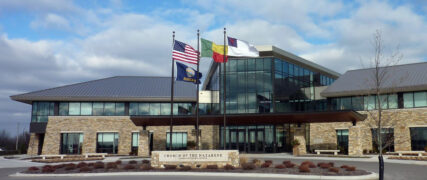— The Rev. Thomas Jay Oord is accused of teaching doctrines contrary to the Church of the Nazarene.

A prominent and prolific theologian in the Church of the Nazarene will face a church trial later this month for advocating for LGBTQ affirmation at a time when the denomination is doubling down on its opposition to same-sex relations.
The Rev. Thomas Jay Oord, an ordained elder and a lifelong member of the denomination, is accused of teaching doctrines contrary to the Church of the Nazarene. He is also being charged with conduct unbecoming of a minister for his efforts to move the denomination to affirm LGBTQ people. The church holds that “the practice of same-sex sexual intimacy is contrary to God’s will.”
If found guilty, Oord could lose his preaching credentials or possibly even his church membership. His trial will take place in Boise, Idaho, on July 25.
The trial follows last year’s guilty verdict against a San Diego Nazarene minister who published an essay in a book co-edited by Oord, titled “Why the Church of the Nazarene Should Be Fully LGBTQ+ Affirming” arguing that the church should have more dialogue on LGBTQ issues.
That minister, the Rev. Selden Kelley, who pastored San Diego’s First Church of the Nazarene, was stripped of his credentials and can no longer pastor a church or hold any position of leadership within the Church of the Nazarene.
Oord, who in 2015 was pushed out of his job at Northwest Nazarene University for his progressive views more generally, said the church tried to gag him into keeping silent about his upcoming trial. He has decided to speak publicly about it anyway. Two weeks ago he published a book called “My Defense: Responding to Charges that I Fully Affirm LGBTQ+ People.”

“I’m convinced that I won’t get fair treatment going through the trial process,” Oord said. “And I want most of all to make a defense based on theology, not based on the legal nuances of the denomination’s manual.”
Oord has written widely that love is the center of what it means to follow Jesus and that love lies at the heart of holiness. Holiness is a critical doctrine of the Church of the Nazarene, which was formed out of the 19th-century Wesleyan-Holiness movement.
The 2.5 million-member global denomination is theologically conservative and has seen more growth overseas. It is declining in the U.S., where it has about 500,000 members in 4,600 churches.
The Rev. Scott Shaw, the district superintendent of the Intermountain District Church of the Nazarene who brought the charges against Oord, declined to comment on trial.
The church, which is governed by six elected general superintendents, last year put out a statement that the church’s positions on human sexuality, along with other positions on Christian character and conduct found in its manual or rulebook, were essentially doctrine.
This tightening of a church’s social policies and elevating them to the status of doctrine has also characterized recent moves in the Christian Reformed Church. The United Methodist Church, to which the Church of the Nazarene is more theologically akin (both trace their origin to John Wesley), underwent a major split over LGBTQ inclusion, losing 25% of its U.S. churches and more recently all its churches in the Ivory Coast of Africa. At its most recent conference, the church voted to repeal the denomination’s condemnation of homosexuality from its rulebook and allow LGBTQ people to be ordained and ministers in the denomination to marry same-sex couples.

Oord said he became “queer affirming” in the early 1990s and spent the next few decades helping queer students at Eastern Nazarene College and later at Northwest Nazarene University feel embraced and loved. He now directs doctor of ministry students at Northwind Theological Seminary, an online-only school. His daughter, Alexa, with whom he co-edited “Why the Church of the Nazarene Should be Fully LGBTQ+ Affirming,” is bisexual.
Oord said he believes the majority of scholars in the Nazarene affiliated universities and seminaries are LGBTQ affirming but won’t say so publicly because they fear for their jobs. One of them, K. Steve McCormick, a professor emeritus at Nazarene Theological Seminary, is expected to testify on Oord’s behalf at the trial.
Last year, a dean at Point Loma Nazarene University, Mark Maddix, was fired for siding with a colleague who lost her job, also for siding with LGBTQ rights.
Church trials are a recent phenomenon in the denomination, said Ron Benefiel, an academic and a minister in the denomination. He said he anticipated that if Oord is found guilty there will be an appeal.
Oord said he is speaking out, against the guidance of the church, because he wants to encourage queer people and their allies and because he wants to make a theological case for LGBTQ inclusion.
“I really want to see the denomination live up to the calling of love that it claims that we’re trying to pursue,” Oord said. “It’s my belief that love requires people who are trying to be followers of Jesus to be fully affirming of queer people.”
Complete Article ↪HERE↩!




